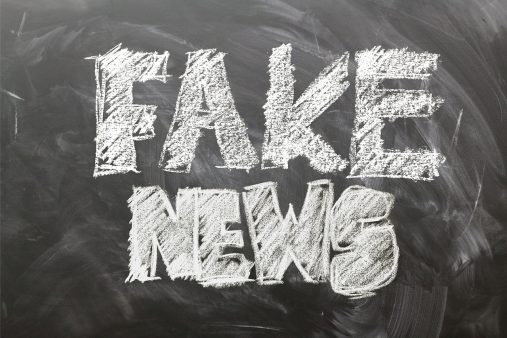Can Exposure to “Fake News” Damage Our Intellectual Character?
15 January 2018
There is no denying the current widespread interest in the phenomenon of “fake news”. Reflection on the quality of recent political debates has fuelled concerns about the use of inaccurate and misleading stories and statistics. In response, politicians have begun proposing legislation to combat the spread of misleading information, while technology firms have struggled to uncover ways of highlighting potentially dubious news articles, and journalists have attempted to track the untruths uttered by prominent figures.
Researchers and academics have also been turning their attention to this issue. For those of us who study questions of intellectual character, the phenomenon of fake news offers an interesting case study. For example, we can ask what fake news reveals about the intellectual character of those who distribute it. Do those who spread fake news provide examples of negative character traits, such as dishonesty, intellectual negligence, or even intellectual malevolence? And can the study of those who distribute fake news provide us with insights into the nature of these undesirable traits?
These are interesting and timely questions. But I think it is important to also extend our focus. We should not only be considering what fake news reveals about the intellectual character of its distributors. We should also be concerned about its potential impact on the intellectual character of its audience.
What is Fake News?
Fake news involves the spreading of false or misleading information that has the potential to deceive or to confuse. In some cases, this is done with the aim of misinforming the public, or encouraging division on important topics (as in the alleged “weaponising” of misinformation by Russia). In other cases, the aim might be relatively benign, such as to provide entertainment (as in the case of satirical news shows and websites). Both misinformation with the intention to deceive, and misinformation with the intention to entertain, can be included as fake news.
Important Aspects of our Intellectual Lives.
In our intellectual lives, there are (at least) two different things that we might be concerned about. First, we are typically concerned to get things right. We want true beliefs rather than false ones, and to be knowledgeable rather than ignorant. This might be for practical reasons (we want true beliefs about the weather forecast so that we can plan accordingly), or simply because we are interested in a particular topic (we just want to know how the story ends). We can call this concern to get things right, to gain knowledge and true beliefs, the concern for intellectual outcomes.
This needn’t be all that we care about in our intellectual lives. In addition to getting things right, we might also want to be a certain kind of person. We are likely to resent any suggestion that we are gullible, or prejudiced, or dishonest. And we might pride ourselves on our tendency to carefully examine the evidence, or on our refusal to deceive others. In philosophy, negative intellectual traits (such as dishonesty, gullibility, and arrogance) are referred to as intellectual vices, while positive intellectual traits (such as honesty, intellectual rigour, and intellectual humility) are referred to as intellectual virtues. We can call the concern to have intellectual virtues, and to avoid intellectual vices, the concern for intellectual character.
Fake news is relevant to both intellectual outcomes and intellectual character. Most obviously, exposure to misleading news stories can make it difficult to uncover truths and to gain knowledge. In this way, fake news frustrates the concern for intellectual outcomes among its audience. In addition, the tendency to spread fake news calls into question the intellectual character of its distributors. (For more on this, see an earlier post on this blog.)
Given this, it might be thought that the main import of fake news is its damaging impact on the intellectual outcomes of its audience, or what it reveals about the intellectual character of its distributors. However, I want to suggest that fake news can also have a damaging impact on the intellectual character of its audience.
How Can Exposure to Fake News Damage Our Intellectual Character?
Here are two ways in which exposure to fake news can make it less likely that we will develop intellectual virtues, and can even encourage intellectual vice.
Firstly, exposure to fake news can cause the corruption of appropriate schemas. A person’s “schema” of some ideal is simply their understanding of what that ideal involves. So someone’s schema of “good teacher” might involve things like patiently explaining important ideas to students, and their schema of “good politician” might involve things like standing up for constituents. The importance of schemas for the development of virtue has been discussed in recent work in philosophy.[i] The problem with fake news is that it can alter our schema of what it means to be a good participant in debate.
The more commonplace fake news becomes, and the more we become aware of the success of those who are willing to distort facts and mislead others, the more likely it is that we will come to associate being a good debater with being willing to employ such tactics. (This has already occurred to some extent in political debates, with praise being bestowed on those politicians, or their surrogates, who can effectively “pivot” away from answering difficult questions.) If our schema of a good and effective debater comes to include a willingness to win at all costs, then we will be less likely to engage in virtuous behaviour ourselves, to the detriment of our intellectual character.
Secondly, fake news, particularly satirical news, has the potential to undermine our motivation for truth. Satirical shows (such as The Daily Show, Saturday Night Live and Late Night with Seth Meyers) tend to mix discussion of accurate news stories with the presentation of fake stories designed to entertain or amuse. The problem here is that we can become accustomed to having our news presented to us with a punchline, or in a way that emphasises its value as entertainment.
Recent work in psychology has suggested that receiving benefits or rewards for certain behaviour can actually weaken our motivation to act in that way.[ii] Those with a pre-existing motivation to help others, for example, may become less motivated to help if they grow accustomed to being rewarded for their efforts. Their motivation switches towards gaining the rewards, and away from helping others for its own sake. My concern is that something similar can happen to our motivation to seek out and pay attention to news coverage.
As we grow accustomed to gaining entertainment from news, this has the potential to weaken our motivation to find out the information that (accurate) news contains. The watching and consuming of news content can become a means to entertainment, rather than an end in itself. And our tolerance for important but unflashy news stories may be undermined. Anyone whose tolerance is undermined in this way will struggle to develop and maintain important intellectual virtues, including intellectual rigour and intellectual perseverance.
If we care about our intellectual character, then it is important to reflect on whether fake news can have a negative impact on this aspect of our intellectual lives. Instead of focusing solely on the impact of fake news on the knowledge that we can achieve, we ought to also be concerned about its impact on the sort of people that we can become.
Further Questions.
Important questions for future work on this topic include:
(1) How does our social environment impact on the intellectual virtues and vices that we develop?
(2) Are the claims made here about the negative impact of fake news accurate? Can those claims be supported by empirical research?
(3) Would proposed legislation or technological fixes designed to lessen the negative impact of fake news on our intellectual outcomes, also be effective in lessening its negative impact on our intellectual character?
These are interesting times for the study of intellectual character. I look forward to seeing what future work on these questions will uncover.
[i] Nancy Snow (forthcoming), “From Ordinary Virtue to Aristotelian Virtue”, in T. Harrison and D. Walker (eds.), The Theory and Practice of Virtue Education, Routledge. For discussion, see Alan T. Wilson & Christian B. Miller (forthcoming), ‘Virtue Epistemology and the Development of Intellectual Virtue” in H. Battaly (ed.) The Routledge Handbook of Virtue Epistemology, Routledge.
[ii] For discussion, see Heather Battaly (2015), Virtue, Polity Press, Ch. 7.
Picture “Hoax” under cco license from Pixabay
- July 2024
- June 2024
- May 2024
- April 2024
- March 2024
- February 2024
- January 2024
- December 2023
- November 2023
- October 2023
- September 2023
- August 2023
- July 2023
- June 2023
- May 2023
- April 2023
- March 2023
- February 2023
- January 2023
- December 2022
- November 2022
- October 2022
- September 2022
- August 2022
- July 2022
- June 2022
- May 2022
- April 2022
- March 2022
- February 2022
- January 2022
- December 2021
- November 2021
- October 2021
- September 2021
- August 2021
- July 2021
- June 2021
- May 2021
- April 2021
- March 2021
- February 2021
- January 2021
- December 2020
- November 2020
- October 2020
- September 2020
- August 2020
- July 2020
- June 2020
- May 2020
- April 2020
- March 2020
- February 2020
- January 2020
- December 2019
- November 2019
- October 2019
- September 2019
- August 2019
- July 2019
- June 2019
- May 2019
- April 2019
- March 2019
- February 2019
- January 2019
- December 2018
- November 2018
- October 2018
- September 2018
- August 2018
- July 2018
- June 2018
- May 2018
- April 2018
- March 2018
- February 2018
- January 2018
- December 2017
- November 2017
- October 2017
- September 2017
- August 2017
- July 2017
- June 2017
- May 2017

